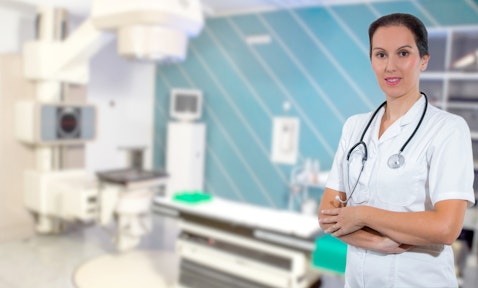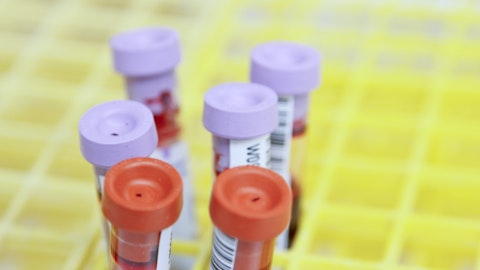Champions Oncology, Inc. (NASDAQ:CSBR) Q1 2024 Earnings Call Transcript September 15, 2023
Operator: Greetings. Welcome to the Champions Oncology First Quarter Fiscal Year 2024 Earnings Call. At this time all participants are in a listen-only mode. A question-and-answer session will follow the formal presentation. [Operator Instructions] Please note, this conference is being recorded. I will now turn the conference over to your host, Dr. Ronnie Morris, CEO of Champions Oncology. You may begin.
Ronnie Morris: Good afternoon. I am Ronnie Morris, CEO of Champions Oncology. Joining me today is David Miller, our Chief Financial Officer. Thank you for joining us for our quarterly earnings call. Before I begin, I will remind you that we’ll make forward-looking statements during today’s call and that actual results could differ materially from what is disclosed in those statements. Additional information on factors that could cause results to differ is available on our Forms 10-Q and Form 10-K. A reconciliation of non-GAAP financial measures that may be discussed during the call to GAAP financial measures is available in the earnings release. I’ll start by pointing out that our prepared comments for today will be relatively brief as we just recently provided our fiscal year-end results and company update six weeks ago.

adriaticfoto/Shutterstock.com
On that call, I provided an update on the accomplishments from fiscal year 2023, along with the longer-term strategic vision for the company. I also highlighted the challenges we encountered such as the overall economic environment, which led to cancellations well in excess of our historical norms. Additionally, we identified some operational issues that led to slower revenue conversion and put pressure on our operating results that may extend into fiscal year 2024. As indicated, those challenges are impacting our current year’s results. However, I’m cautiously optimistic that we have made significant progress towards reversing those trends. We have made the necessary operational changes with some key hires in internal restructuring that we’re confident will lead to greater efficiencies and an improvement in our operations.
Externally, some of the economic pressures that were impacting customer behavior, resulting in longer sales cycle and higher and quicker propensity to cancel studies seems to be easing. On a positive note, our quarterly bookings have continued to grow, and we’re seeing a softening of the cancellations over the last couple of months, retreating towards historical levels. We continue to be excited about our expanding ex vivo platform, which we anticipate will lead to increased sales and revenue growth over the coming quarters. In our clinical biomarker services, we’ve made some key business development hires during this quarter. We have seen an increase in lead generation in addition to an uptick in clinical bookings. As discussed over the years, the revenue from clinical work has a longer cycle than our traditional services, but the increase in the pipeline and in bookings are positive developments that should contribute to revenue growth over time.
With regard to Corellia, our wholly-owned drug development subsidiary, our lead discovery programs are progressing well through the therapeutic discovery stages with our two lead programs exhibiting promising results. We have begun building therapeutic programs around these targets. Our platform has identified many other exciting targets, and we are actively engaged with investors in an effort to raise capital to support and accelerate our growth. In summary, the quarter’s performance was generally as expected. We anticipate that improvements will slowly take hold and put us back on our targeted path. Despite this being a challenging period, we continue to have robust bookings and comprehensive platform, a stellar reputation and a strong team that is poised for the next growth spurt.
We are confident that we will emerge with strong revenue and profitability over the longer term. Now let me turn the call over to David Miller for a more detailed review of the financial results.
David Miller: Thanks, Ronnie. Our full results on Form 10-Q will be filed with the SEC later today. Our first quarter revenue was $12.6 million, a decline of 9% from the first quarter of 2023. As highlighted on our year-end call and reiterated by Ronnie, the challenges encountered last year will impact our financial performance in the first half of 2024, with a gradual improvement occurring over the course of the year. On a GAAP basis, our loss from operations for the first quarter of 2024 was $2.6 million compared to a loss of $284,000 in the prior year. Included in the $2.6 million loss were noncash expenses of stock comp and depreciation totaling approximately $900,000. Excluding these noncash items, our adjusted loss was $1.7 million for the quarter compared to adjusted EBITDA of $450,000 in the year ago period.
Turning the focus to our cash-based results, the total cost of sales was $7.5 million compared to $6.9 million in our first quarter last year, an increase of 9%. The increase relative to the same period last year was primarily due to an increase in outsourced lab services and launch [ph] costs. Due to the increase in cost of sales on lower revenue, our gross margin for the quarter was 40% compared to 50% for the same period last year. The margin pressure will continue for the next few quarters, but we anticipate gradual improvement as our revenue accelerates over the course of the year, while our cost of sales will increase at a much slower rate. For the quarter, R&D expense was approximately $2.8 million compared to $2.9 million in the year ago period.
Our R&D spend is split between our traditional R&D supporting our core business services and investing in our drug discovery platform. Approximately $1.2 million was invested towards our drug discovery efforts during the quarter. Sales and marketing expense for the quarter was a flat $1.6 million. Our G&A expense was $2.3 million compared to $1.9 million in the year ago period, an increase of $400,000. The increase was primarily due to a small increase in compensation expense and the bad debt and credit loss allowances. Now turning to cash, we ended the quarter with $5 million of cash on the balance sheet and no debt. For the quarter, cash used in operating activities was $3.8 million with an additional $700,000 for investment in lab equipment and $600,000 in financing activities as part of our stock repurchase plan.
The accelerated cash burn for the quarter was due to multiple factors, including our net loss and a return of customer deposits on canceled studies, which reduced our deferred revenue and cash balance. As our operational results improved, cancellations decreased and with our bookings, which are our leading indicators of higher revenue, continuing to grow, our cash position remains solid and will gradually increase over the second half of the year. In summation, our first quarter financial results were mostly as expected. We project that results would still be impacted by the challenges faced in our fiscal 2023. However, with our continued strength in bookings and with the operational corrections made beginning to take effect, and with an improving economic environment we’re experiencing, we’re confident that despite some short-term obstacles, our long-term prospects are positive.
We anticipate a slow but steady improvement in our operational results, including revenue growth and profitability as the year progresses. We look forward to our next update in mid-December when we report our second quarter results. We will now open the call for questions.
See also Long-Term Returns of Paul Singer’s Activist Targets and 20 Best European Countries to Find a Girlfriend.
Q&A Session
Follow Champions Oncology Inc. (NASDAQ:CSBR)
Follow Champions Oncology Inc. (NASDAQ:CSBR)
Receive real-time insider trading and news alerts
Operator: Thank you. At this time we will be conducting a question-and-answer session [Operator Instructions]. And the first question today is coming from Matt Hewitt from Craig-Hallum Capital Group. Matt, your line is live.
Matt Hewitt: Good afternoon. Thank you for taking the questions. Maybe first one regarding the landscape. Obviously, we’ve been hearing, not just from you guys on your Q4 call, but today, and we’ve heard from others that it’s just a really difficult environment right now. Pharma and biotech companies are facing funding pressures. There’s all sorts of issues. What are you hearing from your customers as far as these cancellations are concerned. It sounds like it’s coming down, but is that a function of them reprioritizing pipelines? Is it a function of kind of shifting gears and maybe exiting one area to focus on something else, and that’s what this next leg is going to be? Or is there something else driving the, I guess, what’s an improving booking situation?
Ronnie Morris: Yes. I think it’s a — I think, Matt, it’s a combination of all of the above. I think that the cancellations that we had over the last couple of quarters were primarily from things that booked a little earlier. And those, I think, were driven more by, I would say, the budgetary concerns of just are they going to be funded? I think that the newer ones are more of a prioritization where they might book something and then they might decide that with the landscape that they want to prioritize one thing over the other. I think I would say two comments. And these are all very general because there’s so many anecdotes. But I would say two comments. One that we have seen a palpable kind of a decrease in cancellations over the last couple of months.
So it wasn’t just one month or two months, now it’s the third month. So we’re kind of confident that from that perspective, those are moving in the right direction. And I would say the second thing is that we feel like things are opening up more now in terms of the mood or the feeling. The biotech’s feeling like things are opening up for them to raise money and continue to fund their program. So certainly not the way it was a couple of years ago in terms of just a tremendous amount of influx and the feeling like there’s always going to be money available, but we feel much better than we did, let’s say, a year ago.
Matt Hewitt: Got it. So maybe more back to a more normalized lull of capital.
Ronnie Morris: I think so.
Matt Hewitt: Okay. Got it.
Ronnie Morris: I think so, yeah.
Matt Hewitt: Okay. That’s super helpful. And then a question regarding the gross margin. Some of the decline year-on-year was due to increased outsourcing that you guys are doing. Are any of those services something that in theory you guys could bring in-house at some point to reduce your dependence on others to complete some of these studies?
Ronnie Morris: Yes. We could for some of them. I would say the biggest pressure on the gross margins was just some of the delayed studies and the repeating of studies, which we think we have a pretty good handle on now. And that goes to the mouse costs increase because we’re using more mice to get the same amount of work done. So I think that those pressures on the gross margin are probably the largest pressures that I think in the next couple of months, certainly next couple of quarters, I think we’re going to turn back around.
Matt Hewitt: Got it. And then maybe one last one from me and I’ll hop back in the queue. I think you were commenting on the biomarkers and some of the key hires that you were able to get there. You’ve seen an increase in the lead gen and your clinical bookings are improving. How should we be thinking about size of some of those types of studies? Are they bigger than your historical studies? Or just — I know that they’ve got a longer lead time. So I’m just thinking theoretically, those should be larger, right?
Ronnie Morris: Yes. They come in all different sizes, primarily because for certain types of these clinical biomarkers, you first sign a study just to see the validation of an assay. And then if you successfully validate the assay and the biotech or pharma likes the assay and the way it’s working, then they’ll sign a larger study. So it comes — or it’s a validated assay and really then it’s a larger study you’re dealing with. So I think that they’re all different sizes. And from our perspective, I think it took us a couple of years to get our operations correct. Remember, we had talked many years about how it just took us longer to get the labs running efficiently with the right type of regulatory and operational efficiencies.
We’ve accomplished that. The second part was to get the business development team that could actually go out and spread the word that we are in these services because this is a new service line for us. It’s a relatively new service line for us, get the word out that the high quality we do in preclinical work, we can also do in clinical services as well. And that’s why we’re excited about these new key hires in the business development team because we think now we’re going to be able to go out and spread the word and let people know the high-quality work that we do, which will lead to increased business, which we’re already starting to see.
Matt Hewitt: That’s great. Thank you.
Operator: Thank you. [Operator Instructions] The next question is coming from David Baron from Baron Capital. David, your line is live.
David Baron: Good afternoon, Morris. I wanted to ask you a question about your hiring. I know that it’s out there that the Champions is looking to hire. Are your results affecting your hiring goals? Are your hiring goals increasing? Or are they decreasing? And are these positions you’re looking to fill more for entry level or higher level management in which you’re seeking more seasoned employees?
Ronnie Morris: Yes. So we aren’t — we certainly have a couple of positions we’re looking to hire, but we do not have a lot of positions looking to hire. We have a fairly good team. I mean when I say a good team, I mean we have a very good team in terms of quality of people. But we have a — we’re, I think fairly well positioned that I think we, at this point, considering certainly our history, we have very few positions available. So I’m not sure the question in terms of hiring, but I don’t think our hiring has changed. We have a certain expectation for the bookings. We have a certain expectation for the work we want to do. And we have outfitted the organization to meet those expectations and certainly for like the scientific operation, like the ex vivo platform and the biomarkers.
We have built a team that has excess capacity because we need that team in place. We need to be operationally efficient with good quality. And we expect that over the next year or two, we’ll be able to fill it up, and we’ll be able to continue to work efficiently. So I don’t know that we have that many openings right now. We always have openings. There’s always some bit of turnover, but I think we’re hiring the same we’ve always hired.




